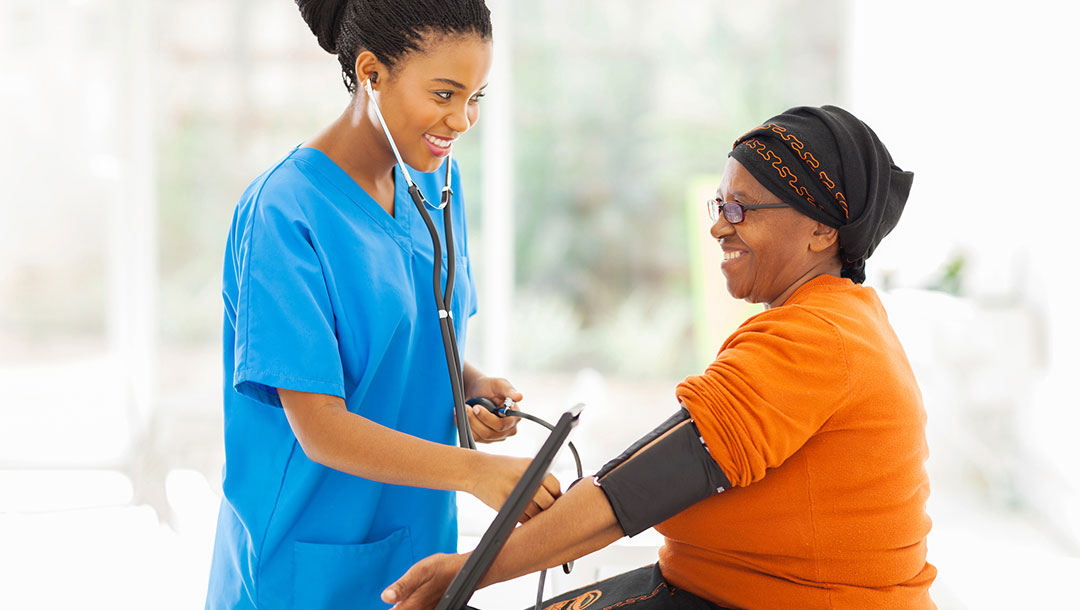Cancer doctors used to think of cancer treatment in terms of extending patients’ lives by a few more months or years. Now, thanks to a better understanding of many kinds of cancer and more advanced treatments, patients often live for many years or decades after diagnosis.
Just for women: Learn your personal risk for heart disease.
Take our Quiz
As cancer survival rates have increased, we’ve learned more about how cancer therapies affect cancer survivors’ long-term heart health. Doctors across the country have begun to take a bigger-picture view of the heart’s overall health during and after cancer treatment. We call this field cardio-oncology, in which heart doctors work with cancer teams to catch or prevent any potential complications and educate patients on making heart-healthy lifestyle choices.
Related research: A Feb. 2018 publication by the American Heart Association highlights the intersection between breast cancer and heart disease.
A team approach for patients’ hearts during and after cancer treatment
Much of the early concept of heart care during cancer treatment focused on the concept of cardiotoxicity, which describes cancer therapies that directly damage the heart. We’ve since learned that we can use an approach similar to how doctors and patients manage diabetes and other chronic conditions.
This process isn’t a one-size-fits-all strategy. You may need more frequent monitoring if you have high blood pressure or other risk factors for heart disease. The doctor might ask to see you more often if you have a past history of heart problems, such as heart failure or cardiomyopathy. And we may need to alter our plans if your cancer treatment changes. My colleagues and I speak daily with our patients’ oncologists and our nurse navigators to keep us connected with every new development.
Related reading: Who’s at risk for heart problems during cancer treatment?
You play an equally important role as your doctors in keeping your heart safe over the long term. You can keep your heart beating strong through regular exercise, controlling your blood pressure and regularly checking in with your cancer doctor on whether your treatment continues to be effective or if you need to try something else.
Exercise
The most important advice I give my patients is to stay active. However, effective exercise looks different for each patient. If you haven’t exercised regularly in 20 years, you might need to start with a walk around the block. If you were running 10K races before your cancer diagnosis, a brisk stroll isn’t going to be enough exercise to be effective for you.
Getting the heart pumping is critical for both your heart health and your cancer management, but it’s also good for us as a measurement tool. By being aware of how much you can exercise—whether that’s a spin class, a vigorous game of basketball or whatever you enjoy—we can use your respiratory function as an early-warning system. A sudden shortness of breath during an activity you used to complete with no trouble may be a sign that your heart is having trouble pumping.
Blood pressure control
High blood pressure is a common side effect of several types of cancer treatment and also a risk factor for many forms of heart disease. Your cancer or heart doctor may recommend several steps to maintain a healthy blood pressure, including:
- Lose weight if you’re overweight or obese
- Reduce the amount of sodium and fat in your diet
- Stop smoking or using other forms of tobacco
If these lifestyle changes aren’t enough to improve your blood pressure, you may need to see a cardiologist, so we can prescribe medication to help.
Regular check-ins with your cancer doctor
You might not need to see a heart doctor on a regular basis if your heart is healthy, but it’s a good idea to follow up regularly with your cancer doctor even after you’ve completed treatment. Let them know about any sudden or unusual symptoms as soon as possible. Heart-related complications of cancer therapy can show up years or even decades after treatment, so we want to catch anything that may arise quickly to achieve the best possible outcomes. Stay engaged in the treatment and follow-up process. Ask questions and share any concerns you may have.
As more people continue to live longer after cancer, the issue of heart health for survivors is only going to grow in importance. Thankfully, the changes in heart function we can see during treatment may be reversible. Even if your heart’s function is reduced during cancer treatment, we can manage it well with medications and other options. It’s possible you’ll never even notice a difference.

